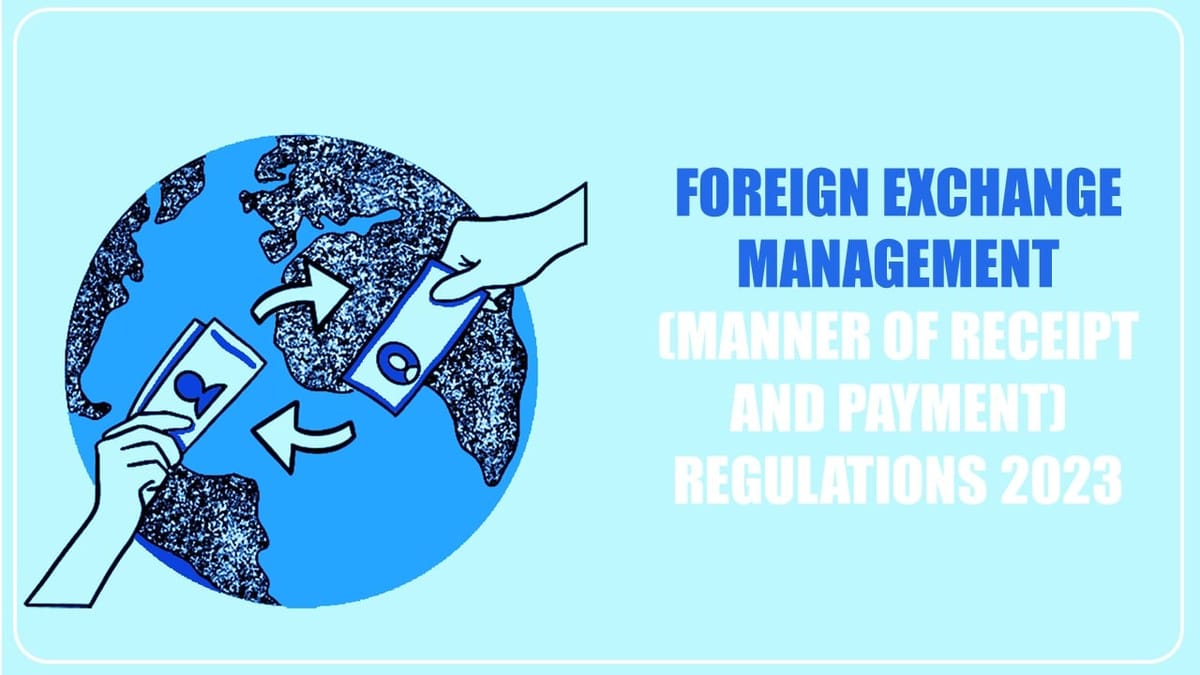Priyanka Kumari | Dec 23, 2023 |

RBI Notifies Foreign Exchange Management (Manner of Receipt and Payment) Regulations, 2023
In the exercise of the powers conferred by Section 47 of the Foreign Exchange Management Act, 1999 (42 of 1999) and in supersession of Notification No. FEMA 14(R)/2016-RB dated May 02, 2016, except for things done or omitted to be done before such supersession, the Reserve Bank makes the following regulations, namely:
Title and commencement:
1. The Foreign Exchange Management (Manner of Receipt and Payment) Regulations, 2023 shall be known accordingly.
2. They come into effect on the date they are published in the Official Gazette.
Definitions:
1. Unless the context indicates otherwise,
(i) ‘Act’ refers to the Foreign Exchange Management Act, 1999 (42 of 1999);
(ii) ‘Authorised Bank‘ has the same meaning as defined in the Foreign Exchange Management (Deposit) Regulations, 2016, as amended from time to time.
2. The meanings of words and expressions used but not defined in these regulations shall be the same as those attributed to them in the Act.
Method of payment and receipt:
1. No person resident in India shall make or receive payment from a person resident outside India, save as expressly provided in the Act or the rules or regulations enacted or instructions given under the Act:
Provided, however, that the Reserve Bank may, upon application, authorise a person residing in India to make or receive payments under the Act.
2. Unless otherwise provided, receipt and payment between a person located in India and a person resident outside India must be made through an Authorised Bank or Authorised Person and in the manner indicated below:
(I) Trade transactions :
(a) The receipt/payment for defined goods and services exported to or imported from the countries listed below shall be made as follows:
(i) Nepal and Bhutan – in Indian Rupees; provided, however, that in the case of exports from India where the importer in Nepal has been granted permission by the Nepal Rashtra Bank to make payment in foreign currency, such receipts towards the value of the shipment may be in foreign currency.
(ii) ACU member countries other than Nepal and Bhutan – through the ACU system or as directed by the Reserve Bank to authorised dealers from time to time:
Provided, however, in the situation of imports where goods are shipped to India from an ACU member country (other than Nepal and Bhutan), but the supplier is a resident of a country other than an ACU member, payment may be made in the manner indicated in (iii) below.
(iii) Countries other than ACU members – In Indian rupees or any foreign currency.
(b) Notwithstanding anything in this sub-regulation, receipts and payments may also be made under the Central Government’s current Foreign Trade Policy.
Explanation: The term ‘ACU’ (Asian Clearing Union) has the same meaning as defined in Article I of the ACU agreement, and the ACU mechanism is construed accordingly.
(II) Other than commercial transactions, receipts and payments shall be made as follows:
i) Nepal and Bhutan – in Indian rupees, except international investment in Bhutan, which may be paid in foreign currency;
(ii) Other Countries – In Indian Rupees or any other foreign currency.
(3) Payment and receipt in India for any ongoing account transaction other than a trade transaction between any person living in India and a person located outside India on a visit to India may only be made in Indian Rupees.
Provided, however, that any payment or receipt under regulation 3 may also be made by debit/credit to a bank account maintained under the Act’s rules, regulations, or directives.
In case of any Doubt regarding Membership you can mail us at contact@studycafe.in
Join Studycafe's WhatsApp Group or Telegram Channel for Latest Updates on Government Job, Sarkari Naukri, Private Jobs, Income Tax, GST, Companies Act, Judgements and CA, CS, ICWA, and MUCH MORE!"